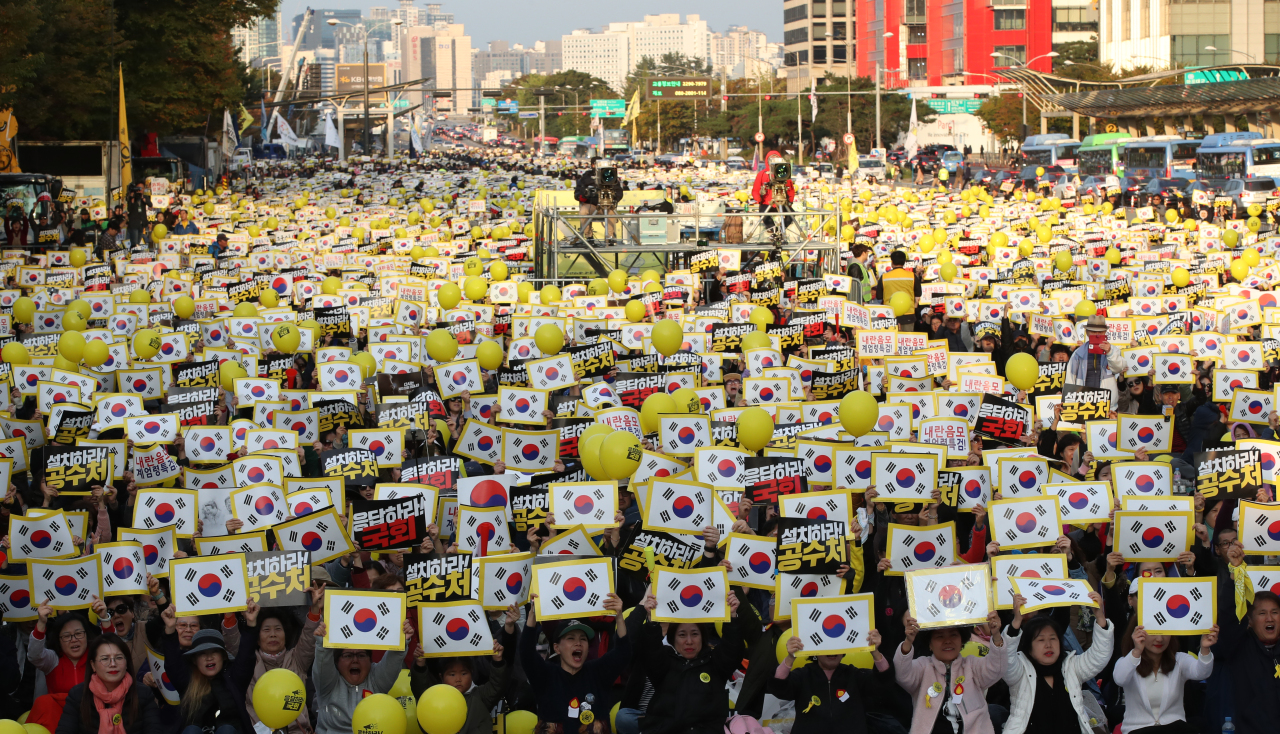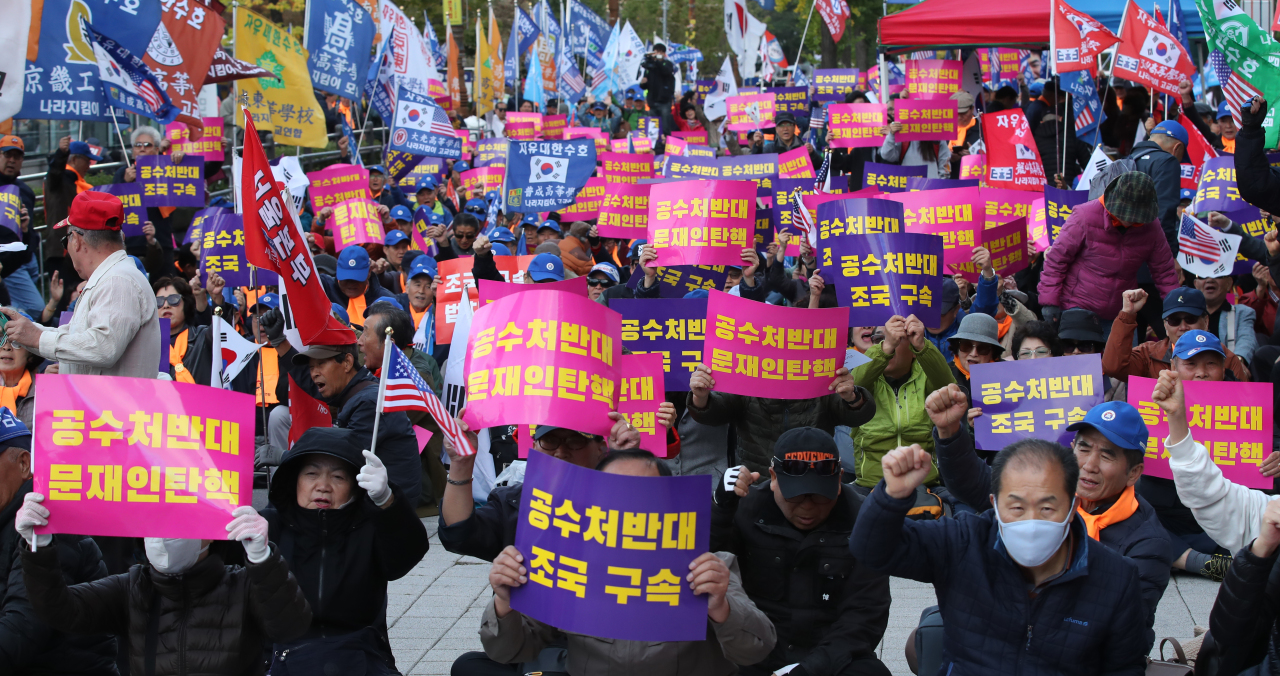[Feature] Anti-corruption body now key political battleground
By Choi Si-youngPublished : Oct. 27, 2019 - 16:35

A large group of liberal protesters gathered near the National Assembly in Yeouido on Saturday chanting, “We the people must change the prosecution.”
Among their key demands was the creation of an independent body to investigate corruption allegations involving senior government officials. Similar calls also reverberated in front of the Supreme Prosecutors’ Office in Seocho-dong, southern Seoul.
Conservatives also held rallies in Yeouido and Seocho-dong, protesting the anti-corruption body. On Friday, leaders of the main opposition Liberty Korea Party joined a rally calling for the abolition of a bill seeking to create an independent anti-corruption body and the resignation of President Moon Jae-in, among others.
Among their key demands was the creation of an independent body to investigate corruption allegations involving senior government officials. Similar calls also reverberated in front of the Supreme Prosecutors’ Office in Seocho-dong, southern Seoul.
Conservatives also held rallies in Yeouido and Seocho-dong, protesting the anti-corruption body. On Friday, leaders of the main opposition Liberty Korea Party joined a rally calling for the abolition of a bill seeking to create an independent anti-corruption body and the resignation of President Moon Jae-in, among others.

The consecutive weekend rallies by those for and against establishing an anti-corruption body highlight the widening gulf between the ruling liberal party and the conservative opposition bloc.
Conservatives fear unchecked power of new body
The prosecution is often accused of having frequently mishandled corruption charges involving senior government officials. Prosecutors were seen as lenient when investigating powerful politicians, tycoons or one of their own.
Liberals blame the exclusive power of prosecutors to investigate and indict people accused of wrongdoing, and the fact that no other government agency can check their abuse of power. They are therefore pressing for a separate anti-corruption body headed by a Cabinet minister.
Conservatives question the unchecked powers of the new body. They argue the body could take ongoing investigations away from the prosecution or police.
They are also unhappy with the composition of the body and the charges it can press. The bill put forward by the liberals mandates the president name the head from two candidates shortlisted by a committee, most of whose members are government officials. The conservatives doubt the body will be fair.
Conservatives also worry that the body can press multiple charges including corruption, such as abuse of power and dereliction of duty. Judges could be wrongly charged, they said.
“Judges could face dereliction of duty charges for a prolonged trial, when in fact they need more time to deliberate a case,” said Cho Jae-yeon, a Supreme Court justice, at a recent parliamentary audit, adding that judges may then shy away from carrying out their duties.
Liberal supporters allay concerns
Supporters of the anti-corruption body argue a committee, set up under the body to decide whom to indict, will keep it in check. They say the committee would comprise citizens who are over 20 years old and who do not hold a license to practice law or have legal education, much like the grand jury in the US.
Conservatives, however, are reluctant to accept nonlegal experts, because South Korea does not observe a jury trial.
“Deciding on indictment requires professional expertise in law. You need to be highly trained to make that judgment,” said Lee Ho-sun, a professor of law at Kookmin University.
Liberals maintain the body would be less politicized if the parliament’s consent is required before the president names its head. But conservatives dismiss the idea because the candidates are shortlisted by a committee dominated by sitting government officials.
Is it unconstitutional?
Conservatives argue the proposed body is unconstitutional.
Article 11 of South Korea’s Constitution prohibits discriminating people based on position or their rank. Conservatives believe the body violates the Constitution as long as it treats senior government officials differently from others.
“Senior public officials are in a way special, but we’re talking about criminal punishment. We need the same procedures for everyone,” said Kim Sang-kyum, a professor of law at Dongguk University.
“If we don’t make sure that happens, then it’s a violation of Article 11 of the Constitution that stipulates ‘no discrimination based on one’s position or rank.’”
But, some legal experts refute the contention.
“The fact that ranking officials are subject to different procedures alone is no justification,” said Cha Jina, a law professor at Korea University. “We need to look at how the parliament identifies the senior officials and rolls out measures to guarantee fair proceedings.”
“If those senior public servants don’t get the same fair and independent trial under the new body, then it will be a breach of the Constitution. The equal rights article entitles them to one,” she said.
Will the bills be put to vote?
In April, the National Assembly fast-tracked a batch of proposed bills, allowing them to be put to a full floor vote without the approval of the relevant committees.
The National Assembly faces an impasse, as the ruling Democratic Party of Korea insists on passing the anti-corruption body bill first before any other bills on the fast track, while all the rest parties oppose the liberal party’s move.
It is unclear whether the parliament will be able to break the deadlock and bring the bills to the floor. But it is clear the passage of the anti-corruption body bill will fundamentally reshape how South Korea’s once almighty prosecution exercises its power.
By Choi Si-young (siyoungchoi@heraldcorp.com)
Conservatives fear unchecked power of new body
The prosecution is often accused of having frequently mishandled corruption charges involving senior government officials. Prosecutors were seen as lenient when investigating powerful politicians, tycoons or one of their own.
Liberals blame the exclusive power of prosecutors to investigate and indict people accused of wrongdoing, and the fact that no other government agency can check their abuse of power. They are therefore pressing for a separate anti-corruption body headed by a Cabinet minister.
Conservatives question the unchecked powers of the new body. They argue the body could take ongoing investigations away from the prosecution or police.
They are also unhappy with the composition of the body and the charges it can press. The bill put forward by the liberals mandates the president name the head from two candidates shortlisted by a committee, most of whose members are government officials. The conservatives doubt the body will be fair.
Conservatives also worry that the body can press multiple charges including corruption, such as abuse of power and dereliction of duty. Judges could be wrongly charged, they said.
“Judges could face dereliction of duty charges for a prolonged trial, when in fact they need more time to deliberate a case,” said Cho Jae-yeon, a Supreme Court justice, at a recent parliamentary audit, adding that judges may then shy away from carrying out their duties.
Liberal supporters allay concerns
Supporters of the anti-corruption body argue a committee, set up under the body to decide whom to indict, will keep it in check. They say the committee would comprise citizens who are over 20 years old and who do not hold a license to practice law or have legal education, much like the grand jury in the US.
Conservatives, however, are reluctant to accept nonlegal experts, because South Korea does not observe a jury trial.
“Deciding on indictment requires professional expertise in law. You need to be highly trained to make that judgment,” said Lee Ho-sun, a professor of law at Kookmin University.
Liberals maintain the body would be less politicized if the parliament’s consent is required before the president names its head. But conservatives dismiss the idea because the candidates are shortlisted by a committee dominated by sitting government officials.
Is it unconstitutional?
Conservatives argue the proposed body is unconstitutional.
Article 11 of South Korea’s Constitution prohibits discriminating people based on position or their rank. Conservatives believe the body violates the Constitution as long as it treats senior government officials differently from others.
“Senior public officials are in a way special, but we’re talking about criminal punishment. We need the same procedures for everyone,” said Kim Sang-kyum, a professor of law at Dongguk University.
“If we don’t make sure that happens, then it’s a violation of Article 11 of the Constitution that stipulates ‘no discrimination based on one’s position or rank.’”
But, some legal experts refute the contention.
“The fact that ranking officials are subject to different procedures alone is no justification,” said Cha Jina, a law professor at Korea University. “We need to look at how the parliament identifies the senior officials and rolls out measures to guarantee fair proceedings.”
“If those senior public servants don’t get the same fair and independent trial under the new body, then it will be a breach of the Constitution. The equal rights article entitles them to one,” she said.
Will the bills be put to vote?
In April, the National Assembly fast-tracked a batch of proposed bills, allowing them to be put to a full floor vote without the approval of the relevant committees.
The National Assembly faces an impasse, as the ruling Democratic Party of Korea insists on passing the anti-corruption body bill first before any other bills on the fast track, while all the rest parties oppose the liberal party’s move.
It is unclear whether the parliament will be able to break the deadlock and bring the bills to the floor. But it is clear the passage of the anti-corruption body bill will fundamentally reshape how South Korea’s once almighty prosecution exercises its power.
By Choi Si-young (siyoungchoi@heraldcorp.com)
-
Articles by Choi Si-young



















![[Today’s K-pop] Treasure to publish magazine for debut anniversary](http://res.heraldm.com/phpwas/restmb_idxmake.php?idx=642&simg=/content/image/2024/07/26/20240726050551_0.jpg&u=)